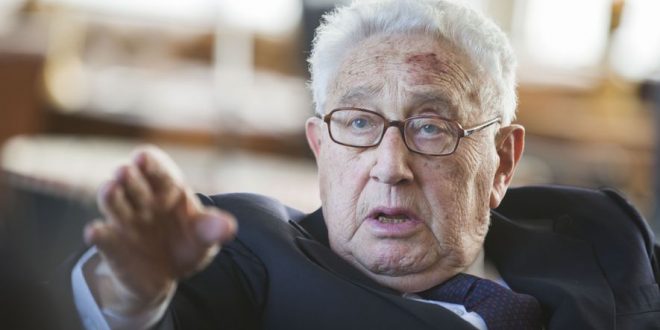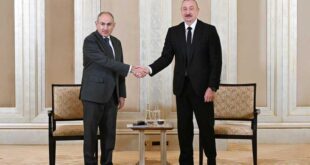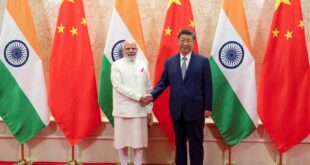Since World War II, the U.S. has chronically fomented instability
Former Secretary of State Dean Acheson tactlessly sermonized that, “The United States was the locomotive of mankind and the rest of the world was the caboose.” The supreme arrogance of the secretary’s bifurcation made no friends but endless enemies. Thus, euphemisms to disguise the ulterior motive of our foreign policy were invented. Power for the sake of power was too crude and off-putting.
Acheson and his cohorts at the outset of the Cold War were delusional in the belief that the United States enjoyed a monopoly on the world’s angelic and enlightened DNA. They were equally deluded in the belief that we were saddled with an obligation to be the leader of the world to direct the affairs of other nations as a conductor directs an orchestra.
But that was nothing new under the sun. Since the beginning of time, nations have crowned themselves a chosen people to justify gratifying hormonal cravings for power and domination. Species narcissism blinds us to that ugly truth about our primal urges.
To self-identify as a master race eager to conquer the world, however, has been bad form since the fall of the Third Reich. In previous times, empires unabashedly trumpeted a foreign policy of the strong do what they can and the weak suffer what they must. Today, nations concoct euphonious explanations for world domination.
The United States, for instance, commonly professes “stability” as its foreign policy objective. But that profession is fact-free. It ranks in risibility with Secretary of State John Kerry’s condemnation of Russia’s annexation of Crimea on the heels of the United States invasion of Iraq justified by Saddam Hussein mythical weapons of mass destruction. Mr. Kerry reprimanded Russia without embarrassment:
“You just don’t in the 21st century behave in 19th century fashion by invading another country on completely trumped up pre-text.”
The United States has chronically fomented instability since World War II. We infiltrated rebels into Eastern and Central Europe and the Balkans to overthrow or weaken Communist governments. The C.I.A. provided paramilitary support to the Dalai Lama and Tibet against Communist China for decades until President Richard Nixon’s 1972 visit.
The CIA overthrew Iran’s democratically elected Prime Minister Mohammed Mossadegh in 1953 in favor of the corrupt and megalomaniacal Mohammed Reza Shah Pahlavi. The overthrow ultimately precipitated the 1979 Iranian Revolution and Ayatollah Khomeini’s accession to power. Iran is now an arch-enemy, a state sponsor of terrorism, and an intermeddler in the affairs of Bahrain, Lebanon, Syria, Yemen, and Iraq.
The CIA overthrew Guatemala’s Jacobo Arbenz in 1954. It ushered in decades of genocidal military rule and domestic convulsions. Gang violence today in Guatemala—which has begotten a surge of refugees to the United States—can be traced to our earlier intervention and its aftermath.
The CIA attempted to overthrow Indonesia’s Sukarno in 1958, but failed. A second attempt succeeded in 1965, which triggered an unspeakable bloodbath chronicled in the film The Act of Killing.
The CIA’s attempted overthrow of Cuba’s Fidel Castro in 1961 was followed by multiple assassination attempts in Operation Mongoose. The seeds were sown for the 1962 Cuban Missile Crisis.
We dropped 300 million tons of cluster bombs during a secret war in Laos, which turned the nation into wilderness.
In more recent years, the United States supported rebels fighting the Sandinista regime in Nicaragua. We supported Kosovo’s violent secession from Serbia. We supported South Sudan’s violent secession from Sudan. The former’s tribal atrocities today are edging towards genocide.
We have created havoc throughout the Middle East, North Africa, and South Asia with our wars in Libya, Somalia, Yemen, Syria, Iraq, Afghanistan, Pakistan, and against al Qaeda and ISIS globally.
We assisted in the overthrow of Ukrainian President Viktor Yanukovych, which precipitated Russia’s annexation of Crimea and a de facto partitioned Ukraine.
To be sure, the United States supports stability when it advances our craving to control the world. Our foreign policy is replete with support for dictatorial or tyrannical governments like Nicaragua’s Somoza, Chile’s Pinochet, Argentina’s generals, Saudi Arabia’s kings, or Yemen’s Ali Abdullah Saleh. The unifying theme, whether stability or instability is sought, is power for the sake of power fueled by chosen people arrogance.
Among the foreign policy glitterati, former Secretaries of State Henry Kissinger and Hillary Clinton may be summoned as further proof. Mr. Kissinger championed the violent overthrow of Chile’s elected President Salvador Allende in favor of the murderous dictator Augusto Pinochet. He explained like a schoolmarm rebuking pupils: “I don’t see why we should have to stand by and let a country go Communist due to the irresponsibility of its own people.”
Mrs. Clinton was equally scornful of conducting 2005 Palestinian elections in Gaza that brought Hamas to power:
“[I]f we were going to push for an election we should have made sure that we did something to determine who was going to win.”
Do not hold your breath for any foreign policy change from President-elect Donald Trump. Power for the sake of power will remain in the saddle.
Bruce Fein – – Monday, November 21, 2016 [emphasis added by Geostrategic Media editorial team*]
Source: Washington Times
 Geostrategic Media Political Commentary, Analysis, Security, Defense
Geostrategic Media Political Commentary, Analysis, Security, Defense





